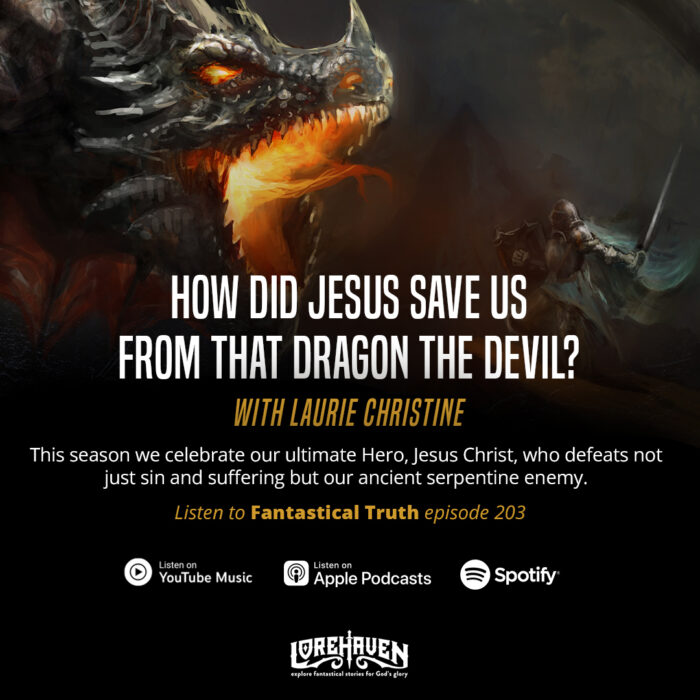Bring In The Gospel, But Leave Your “Isms” At Home
Last month I offered the opinion that we Christian fiction writers shouldn’t hide our lamps under a bushel; we should present the gospel message in a manner that’s both artistic and unambiguous. As several commenters pointed out, fiction isn’t the place for pulpit-pounding, however. The goal is to draw readers into an gripping story that illustrates the point rather than skewering them with it.
 There are countless ways we can do this. One example of an engaging presentation is that of Eustace, the boy-turned-dragon, in The Voyage of the Dawn Treader. He’s soon sorry for his greed, and his companions are sympathetic to his plight; but neither he nor they are able to nullify his sin’s effects. Everyone’s helpless to change his situation until he meets Aslan, who tells him, “You will have to let me undress you.” The lion peeling off the dragon skin and dressing Eustace in new clothes is such a clear illustration of salvation that it makes me tingle as I think about it.
There are countless ways we can do this. One example of an engaging presentation is that of Eustace, the boy-turned-dragon, in The Voyage of the Dawn Treader. He’s soon sorry for his greed, and his companions are sympathetic to his plight; but neither he nor they are able to nullify his sin’s effects. Everyone’s helpless to change his situation until he meets Aslan, who tells him, “You will have to let me undress you.” The lion peeling off the dragon skin and dressing Eustace in new clothes is such a clear illustration of salvation that it makes me tingle as I think about it.
We might focus on various aspects of the story: man’s fall from perfection, God’s authority to judge sin, our inability to save ourselves, the self-sacrificial love or perfect holiness of Christ. It’s not even necessary to show a salvation experience. Sometimes, the message comes across when a character refuses the opportunity to be redeemed.
In one of my first attempts at a novel—which will remain f0rever unpublished, since I typed it on an old-school typewriter and later tossed it, page by page, into the burn barrel—a character stood at the “moment of decision” but chose to reject Christ. She’d suffered at the hand of an abusive father and valued her new-found independence too highly to submit to the Lord’s, or anyone else’s, authority. The book concluded with her feeling certain she’d made the right decision, and she looked toward the future with confidence. Nevertheless, a beta reader (who, interestingly, rejects the Lord herself) complained that the end was too depressing.
We can, and I believe should, present the gospel in one form or another, and to one degree or another. But it’s not only important that we show it, rather than tell it. We also need to keep it basic and centered on Christ.
The simple gospel is a gem of unfathomable proportions. It needs no elaborate setting to make it breathtaking. Bury it in the sands of an epic desert fantasy; hide it in a dragon’s lair; launch it across the galaxy in a starship for an eager reader to find. Give clues to its existence and whereabouts so the reader can find it. But make sure it’s the gem the reader finds, not the box it’s in or the filigree that surrounds it.
it breathtaking. Bury it in the sands of an epic desert fantasy; hide it in a dragon’s lair; launch it across the galaxy in a starship for an eager reader to find. Give clues to its existence and whereabouts so the reader can find it. But make sure it’s the gem the reader finds, not the box it’s in or the filigree that surrounds it.
I like the way Paul put it in 2 Corinthians 11:3. He wasn’t writing to fiction writers, of course, but to real people struggling to live out their faith in the real world. (And isn’t that what we are as Christian writers?)
He said: But I fear, lest by any means, as the serpent beguiled Eve through his subtilty, so your minds should be corrupted from the simplicity that is in Christ.
The King James Version here translates the Greek word haplotes as “simplicity.” Some of the modern versions (NIV, ESV, RSV) translate this as “sincere and pure devotion.” But since haplotes means single or simple, sincere and pure doesn’t convey the intent of the word that Paul, under the Spirit’s inspiration, chose here.
A complex mathematical formula might be sincere, pure, and true; one might even call it beautiful or elegant. But it’s not simple. It’s not single. Only a person trained in higher mathematics can understand it.
The gospel—the one we dare not stray from or corrupt with our religiosity—is beautiful and elegant in its simplicity. It’s as basic as “Jesus Loves Me” but profound enough to transform lives in real and substantive ways.
There’s great depth to the Bible, and, although the gospel story runs through all the scriptures, other doctrines are important as well. But where reaching the lost is concerned (as our Lord commands us to do), the simple gospel is what we must present. Theological issues, like predestination, free will, eternal security, replacement theology, baptism by immersion, transubstantiation, pre-, post-, or a-millennialism, etc., can be confusing at best, and too often bitterly divisive.
The anger, name-calling, accusations, and sometimes savagery that go along with these disagreements tend to turn people off Christianity (small wonder). But separate Jesus from the religiousness—put him at a table with lawbreakers—show His compassion for the weak and imperfect—reveal His impatience with the hypocritical loudmouths of the religious hierarchy—and people who shun churchiness will be drawn to Christ’s divine humanity. When we show His love for them, His sacrifice on their behalf, and His triumph over hopelessness as being something they can get in on, we participate in the Great Commission.



































Everyone loves redemption stories, and the story of the hero laying down his life for his friends. Those are Universal Myth, the story of the dying god. Every nation has a similar story, probably carried away from the dispersion at Babel and flanderized through the generations, yet retaining something of the original idea.
I haven’t had much luck with redeeming the hero himself. For some reason I can’t write that believably, if the hero is such a shmuck that he needs a bigger hero to bail him out. I have better luck giving the hero a rival/foil/friend who the hero has to save or sacrifice for. A smaller picture of Jesus, if you will. It’s easier for a reader to buy, too, than God reaching down from Heaven and solving all the hero’s problems.
That’s my other problem with these books where the hero is in direct contact with God. Shouldn’t they have all the answers to their problems right at their fingertips? And when they don’t call on divine power in every scene, it makes them look like morons.
I know what you mean, Kessie!
That thing about being in direct contact with God and yet still not having all the answers and not being able to call down fire from heaven or command angels whenever they need them is one of the challenges of a story I’m writing. Actually, even the thing about the flawed “hero” touches on my story.
To deal with these questions, I’ve been studying how things worked for people in the Bible. My personal beliefs and worldview are that God still works today like He did in Bible times. Moreso like the New Testament than the Old, since the cross did change a few things, but I still gain a lot of insight from watching the lives of King David, Samson, Abraham / Isaac / Joseph, Moses, Joshua, Esther, etc. The Apostle Paul, the early church — how they heard from God, how they came to consensus on issues, how they knew where to go and what to do. Their mistakes and frailties.
The reason characters (who can talk to God, but don’t seem to know everything or wield divine power at will) like that can seem unbelievable is because of our own misunderstanding about how God works. I think for a book with that kind of character to be successful, we have to make those questions integral to the story and the struggle of the characters.
“If God told you that, then why didn’t He tell you THIS?”
“I don’t know! He doesn’t tell me everything.”
“If you’re like God’s best friend or something, then why didn’t He show up? Why are you the one in chains here? I don’t think this God is who you think He is…”
It’s not an easy thing to handle. Fortunately, we each have different stories to tell and I suspect God gives us what we need to tell them, as we press into the stories and wrestle through writing them. Personally, I love how the challenge of writing my stories presses me to know God better, in order to better express something real of Him somewhere in the story. I discover a lot and grow in my relationship with Him in the process of wrestling through these questions.
While I dislike math, I’ve taken calculus, so your example makes a lot of sense. “Simple” doesn’t mean “easy to understand,” but once you’ve been taught how to use it…ah! It’s like someone flipped on the light switch.
Good post, Yvonne. Reminded me of a short story Bethany editor Dave Long held some years ago. He challenged those on his Faith in Fiction community to write a conversion story–since everyone is always complaining about how preachy they are. It was an interesting exercise.
Because all Christian stories aren’t written with an unsaved audience in mind, however, I think there are stories in which debatable doctrines are appropriate. Why not explore what predestination means? Thomas Hardy wrote to show his fatalistic view of the world. Personally, I think the biggest mistake Christians can make is skirting difficult topics.
Becky
Thanks, Rebecca –
I understand what you’re saying; I agree we shouldn’t avoiding touching on thorny issues just because they’re controversial. But theological questions can only be definitively answered based on a careful reading of the scriptures. Certain biblical principles can be portrayed beautifully through story (like Jesus’s story of “the prodigal son”). But when it comes down to the controversial things, it’s not really possible to iron them out without a Bible study. That would make it hard to incorporate them into a story without the dreaded preachiness.
I wanted to approach this subject because of something a previous commenter said about not understanding the various nuances of Christian doctrine well enough to write about them. This article ended up sounding like I only approve of stories about salvation, which is not the case. What I object to is people trying to making a muddle of their portrayal of salvation by confusing it with or making it dependent on peripheral issues.